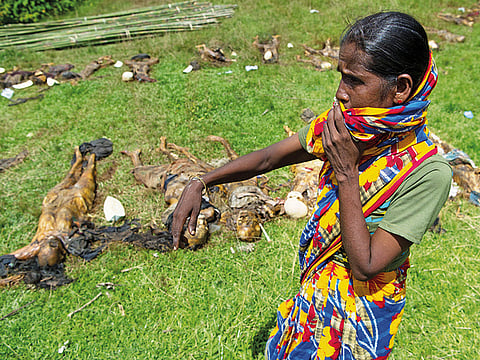UK says ‘unacceptable tragedy’ of Rohingya crisis risks Myanmar progress
United Nations Security Council to discuss escalating tensions in Rakhine and fate of hundreds of thousands of Muslim refugees

Rakhine/Dhaka: The UK has warned Myanmar that the Rohingya crisis is an “unacceptable tragedy” and Aung San Suu Kyi’s government must end the violence and lift a blockade on humanitarian aid.
“What we have seen in Rakhine in the past few weeks is an absolute and unacceptable tragedy,” Mark Field, Britain’s minister for Asia, said on Thursday after a visit to the country, where he met with Aung San Suu Kyi and visited western Rakhine state, the centre of the bloodshed.
“We need the violence to stop and all those who have fled to be able to return to their homes quickly and safely,” he said. “Burma has taken great strides forward in recent years. But the ongoing violence and humanitarian crisis in Rakhine risks derailing that progress,” he added of the ex-British colony.
United Nations secretary-general Antonio Guterres will brief the UN Security Council on the crisis later on Thursday in New York. Guterres has sent a letter to the council to express concern about the “humanitarian catastrophe” unfolding in Myanmar.
Close to half a million Rohingya, a Muslim minority in majority-Buddhist Myanmar, have fled the army into Bangladesh. While the government says it is fighting an emergent “terrorist” group, the UN rights chief, Zeid Ra’ad Al Hussain, has described it as a “textbook example” of ethnic cleansing.
“Field made clear the violence needs to stop, with the security forces taking responsibility to protect all communities and the government allowing full humanitarian access for aid,” the UK’s foreign office said in a statement.
The latest campaign, the deadliest so far, ramped up after the army launched a huge counter-offensive in retribution for guerrilla-style ambushes on August 25 by a Rohingya militant group. Satellite imagery shows more than 200 Rohingya villages have since been burnt.
As Myanmar does not allow unfettered access to the conflict zone, it is impossible to corroborate how many people have died. The army has rebuffed accusations of war crimes and points to attacks by “extremist terrorists” against Buddhists and Hindus.
On Wednesday, the government brought some reporters to an area in northern Rakhine where a mass graves of Hindus, including many women and children, were exhumed this week. Villagers said black-clad attackers had killed more than 100 people. Requests for access to hundreds of Muslim villages have mostly been denied.
The roughly 1.1 million Rohingya have suffered decades of discrimination in Myanmar, where they were not granted citizenship.
Desperate Rohingya have for years paid people smugglers to get them out of the country, often resulting in deaths at sea or exploitation when they are locked up for ransom by the criminals they trusted to deliver them to Thailand and Malaysia.
Thailand is facing mounting calls to stop its policy to push the migrant boats back out to sea. A 2015 Thai crackdown led to ships full of people being stranded at sea, and there are concerns that the recent crisis will lead to a resurgence.
“Thailand urgently needs to set a regional example by adopting humane refugee policies,” said Audrey Gaughran from Amnesty International. “Instead of callously repelling people fleeing unimaginable horrors, the Thai government should ensure safe passage for those seeking international protection in Thailand.”
Aung San Suu Kyi has disappointed human rights groups who looked to her as an icon in the fight against oppressive rule. The Nobel Peace Prize winner spent 15 years under house arrest and won a landslide election in 2015, seen as a huge victory for democratic reform in the country.
The recent violence has shocked governments that ardently supported her, including the UK, and there are concerns for the civilians who have arrived — many with bullet wounds — in Bangladesh.
Oxfam has warned that close to 70 per cent of the nearly 480,000 Rohingya refugees are without adequate shelter and half have no safe drinking water. The international agency launched an urgent appeal for more than £5 million after heavy rains and floods in camps have left people facing extreme hardship.
“Oxfam is witnessing an unprecedented number of refugees arriving into Bangladesh in a very short period of time,” it said. “Tens of thousands don’t have food or clean water. If they are very lucky they have some plastic sheeting to take shelter under — but most of the time families are huddled under sarongs.”



